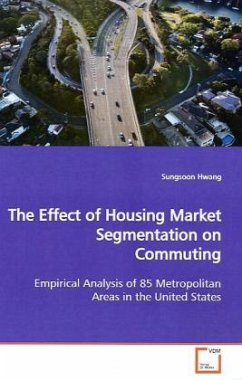
Housing Affordability by Metropolitan Area
Determinant Indicators of Housing Affordability
Versandkostenfrei!
Versandfertig in 6-10 Tagen
32,99 €
inkl. MwSt.

PAYBACK Punkte
16 °P sammeln!
The purpose of this research is to articulate the relationships that exist between housing affordability by metropolitan areas and the following variables: housing costs, income, educational attainment, population density, population growth rate, and employment composition by economic sector (professional, sales and office, and service). This research contributes to the existing affordability literature by considering all of these variables simultaneously through a regression equation based on US Census data. The findings indicate that housing affordability is geographically differentiated wit...
The purpose of this research is to articulate the
relationships that exist between housing
affordability by metropolitan areas and the
following variables: housing costs, income,
educational attainment, population density,
population growth rate, and employment composition
by economic sector (professional, sales and office,
and service). This research contributes to the
existing affordability literature by considering all
of these variables simultaneously through a
regression equation based on US Census data. The
findings indicate that housing affordability is
geographically differentiated with the West Coast
metropolitan areas being the least affordable and
the South Central metropolitan areas being most
affordable. Some of the predictors of housing
affordability appeared to be educational attainment,
employment mix, and population density based on
correlation and regression results.
relationships that exist between housing
affordability by metropolitan areas and the
following variables: housing costs, income,
educational attainment, population density,
population growth rate, and employment composition
by economic sector (professional, sales and office,
and service). This research contributes to the
existing affordability literature by considering all
of these variables simultaneously through a
regression equation based on US Census data. The
findings indicate that housing affordability is
geographically differentiated with the West Coast
metropolitan areas being the least affordable and
the South Central metropolitan areas being most
affordable. Some of the predictors of housing
affordability appeared to be educational attainment,
employment mix, and population density based on
correlation and regression results.












